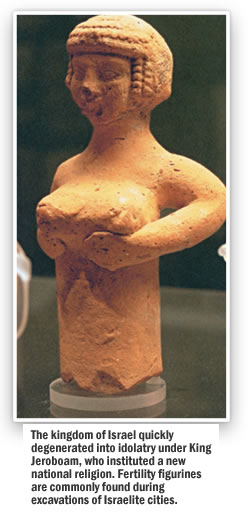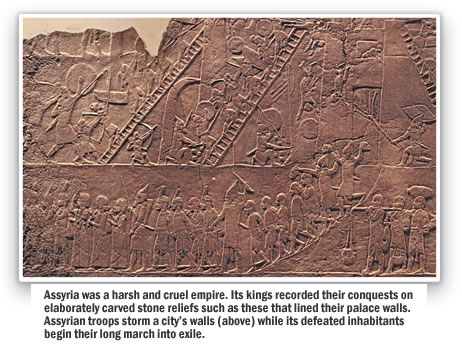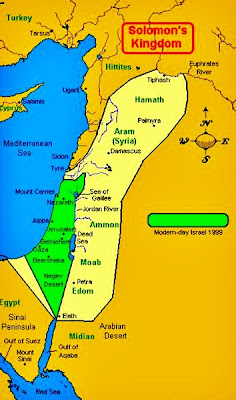
The Rise and Fall of Ancient Israel
One of God's most remarkable claims is found in Isaiah 46:9-10: "For I am God, and there is no other; I am God and there is none like Me, declaring the end from the beginning, and from ancient times things that are not yet done, saying, 'My counsel shall stand ...'" (emphasis added throughout).
Here God not only says that He can reveal the future; He also claims the power to bring it to pass!
Nowhere is this more evident than in the remarkable prophecies of what would happen to Abraham's descendants through Jacob's offspring, the 12 tribes of Israel.
God's promises to Abraham, while astounding in their magnitude, nevertheless started small—with the promise of a son, Isaac, to be born to him and Sarah (Genesis 17:19-21; 21:1-3). Isaac in turn had two sons, Jacob and Esau (Genesis 25:19-26). Jacob had 12 sons, from whom the 12 tribes of Israel are descended.
Prophesied birth of a nation
 But long before this, before Abraham even had a son at all, God revealed to Abraham the fact that his descendants would go through one of the most remarkable "birth processes" a people could go through—they would be enslaved in a foreign land before emerging as a nation.
But long before this, before Abraham even had a son at all, God revealed to Abraham the fact that his descendants would go through one of the most remarkable "birth processes" a people could go through—they would be enslaved in a foreign land before emerging as a nation.
We find this prophesied in Genesis 15:13-14: "Know certainly that your descendants will be strangers in a land that is not theirs, and will serve them, and they will afflict them four hundred years. And also the nation whom they serve I will judge; afterward they shall come out with great possessions."
This is referring, of course, to the Exodus. The remarkable chain of circumstances leading to the fulfillment of this prophecy is spelled out in Genesis 37-50 and Exodus 1-14.
While the Exodus itself is one of the Bible's best-known stories, the events that led up to it aren't so well understood. In brief, Jacob's favorite of his 12 sons, Joseph, was sold as a slave by his jealous brothers and ended up in Egypt (Genesis 37). There, through a series of events and God's blessings, Joseph thrived and amazingly rose to the highest position in the Egyptian government under the pharaoh (chapters 39-41).
When a famine struck the region, Joseph's family migrated to Egypt, which, thanks to Joseph's foresight, had stored enough grain to survive the famine (chapters 42-47). Joseph recognized that God had been behind all these events and that things had worked out this way so that his family would be spared and God's prophecies fulfilled (Genesis 50:19-20).
The 12 sons of Jacob—progenitors of the tribes of Israel—thrived in Egypt (Exodus 1:1-7). But then "there arose a new king over Egypt, who did not know Joseph" (verse 8). The new pharaoh, feeling threatened by the growing number of Israelites, enslaved them and "made their lives bitter with hard bondage" (verse 14).
God called the son of two of these Hebrew slaves, Moses, who through miraculous circumstances had himself been a prince of Egypt but was later a fugitive, to lead Israel out of their enslavement. "I am the God of your father—the God of Abraham, the God of Isaac, and the God of Jacob," He announced to Moses (Exodus 3:6).
God then followed with a remarkable prophecy of what He intended to do with Moses and his countrymen: "I have surely seen the oppression of My people who are in Egypt, and have heard their cry because of their taskmasters, for I know their sorrows. So I have come down to deliver them out of the hand of the Egyptians, and to bring them up from that land to a good and large land, to a land flowing with milk and honey ... Come now, therefore, and I will send you to Pharaoh that you may bring My people, the children of Israel, out of Egypt" (verses 7-10).
What God proposed to do was stunning —to deliver a people from enslavement at the hands of the greatest superpower of their day! The following chapters— covering the 10 plagues and the awesome parting of the Red Sea—show how God indeed miraculously delivered the Israelites, even down to the detail of fulfilling His promise to Abraham that "they shall come out with great possessions" (Genesis 15:14; compare Exodus 11:2; 12:35-36).
Israelites in the Promised Land
Following Israel's miraculous deliverance from Egypt came the periods of the 40 years in the wilderness, the conquest of the Promised Land and the period of the Israelite judges. Many specific minor prophecies were given and fulfilled during this time as recorded in the biblical books of Exodus, Numbers, Deuteronomy, Joshua and Judges.
When we come to the establishment of the Israelite monarchy, we find that the dynasty of Israel's most famous king, David, had been prophesied to arise from the tribe of Judah centuries before, while the Israelites were still in Egypt (Genesis 49:8, 10). Like many prophecies, this was dual—meaning it had more than one intended meaning or fulfillment—in that it also foretold that the coming Messiah, Jesus Christ, would come from the tribe of Judah (compare Hebrews 7:14).
Because of space limitations we won't go into the dozens of specific prophecies that were given and fulfilled during the several centuries that the kingdoms of Israel and Judah existed, but will touch on only the most significant.
After righteous King David's passing, his son Solomon ascended the throne. Solomon had it all—a powerful kingdom he inherited from his father, humility, and wisdom and wealth granted to him by God (1 Kings 3:11-13). Under his reign the kingdom of the combined tribes of Israel grew even more powerful, dominating the region.
But, regrettably, while Solomon knew what he should do, he lacked the personal character and conviction to carry it out. His heart was turned from serving the one true God to serving the pagan gods and idols of the lands around him (1 Kings 11:4-8).
The kingdom divides
 Solomon's ill-chosen path set the kingdom on a road from which there would be no recovery. Because of Solomon's sins, God announced that He would tear the kingdom away from him and give it to one of Solomon's subjects (verses 11-13). Indeed, most of the kingdom would split away to follow a rival; only a minority would remain to follow Solomon's son and the kings of David's line.
Solomon's ill-chosen path set the kingdom on a road from which there would be no recovery. Because of Solomon's sins, God announced that He would tear the kingdom away from him and give it to one of Solomon's subjects (verses 11-13). Indeed, most of the kingdom would split away to follow a rival; only a minority would remain to follow Solomon's son and the kings of David's line.
This prophecy was fulfilled a few years later at Solomon's death when most of the tribes broke away to follow Jeroboam, leader of the northern kingdom, Israel. The rest remained with Solomon's successor, Rehoboam, leader of the southern kingdom of Judah (1 Kings 12; 2 Chronicles 10-11). The two kingdoms would become rivals—and sometimes enemies—for the next two centuries.
Most people assume that the Jews and Israelites are one and the same. But this is clearly not true. Any look at history and these relevant Bible chapters shows they were two separate kingdoms, the kingdom of Israel and the kingdom of Judah (from which the term Jew is derived). As an interesting historical note, the first time the word Jews appears in the Bible, it is in 2 Kings 16:5-6 (King James Version) where Israel is allied with another king and at war with the Jews.
Israel's first king, Jeroboam, quickly established a pattern of idolatry and syncretism (mixing elements of true and false worship) from which the northern kingdom would never depart (1 Kings 12:26-33). God sent many prophets to warn the Israelite kings of the destruction that would come their way if they didn't return to Him.
The first of these was Ahijah, who gave this warning to Jeroboam's wife: "For the LORD will strike Israel, as a reed is shaken in the water. He will uproot Israel from this good land which He gave to their fathers, and will scatter them beyond the River ..." (1 Kings 14:15).
This was a clear pronouncement of the northern kingdom's fate if they wouldn't repent—they would be taken captive "beyond the River" (the Euphrates) at the hands of the coming Assyrian Empire.
Many other prophets followed, repeating God's warnings to the Israelites and their kings, pleading with them to repent lest they suffer that awful fate. Among these prophets were Amos, Hosea, Isaiah and Micah, whose messages are recorded for us in the biblical books that bear their names.
But the messages of these prophets went unheeded. Finally, in 722 B.C., after a series of attacks, invasions and deportations, the northern kingdom was crushed and its people carried away into captivity at the hands of the Assyrians—"beyond the River" as God had warned their first king two centuries earlier.
Judah follows in Israel's footsteps
The story of Judah, the southern kingdom, is somewhat different though equally tragic. Both kingdoms quickly abandoned the true God and sank into moral and spiritual depravity. While the northern kingdom never once had a righteous king, Judah at least had a handful who turned to God and instituted religious reforms aimed at turning the people to proper worship of the true God.
These righteous kings were somewhat successful, at least for a while. As a result, the kingdom of Judah outlasted its northern neighbor by more than a century. Yet eventually those in Judah, too, would pay a heavy price for rejecting their Creator.
 They should have learned a lesson from the captivity of the 10 northern tribes, especially since some of the same Assyrian invasions devastated much of Judah. In Hezekiah's day virtually all of Judah except for its capital, Jerusalem, was conquered by the Assyrians—and Jerusalem, too, would have fallen had God not supernaturally delivered the city (2 Kings 18-19).
They should have learned a lesson from the captivity of the 10 northern tribes, especially since some of the same Assyrian invasions devastated much of Judah. In Hezekiah's day virtually all of Judah except for its capital, Jerusalem, was conquered by the Assyrians—and Jerusalem, too, would have fallen had God not supernaturally delivered the city (2 Kings 18-19).
The prophet Isaiah, speaking to Hezekiah, was the first to reveal the specific enemy that would subjugate Judah if they, too, refused to change: "... 'Behold, the days are coming when all that is in your house, and what your fathers have accumulated until this day, shall be carried to Babylon; nothing shall be left,' says the LORD. 'And they shall take away some of your sons who will descend from you, whom you will beget; and they shall be eunuchs in the palace of the king of Babylon'" (2 Kings 20:16-18).
God sent many other prophets— including Micah, Zephaniah, Habakkuk and Jeremiah—to warn Judah, but to no avail. As the Assyrians vanquished the Israelites in several waves of invasions and deportations, so the Babylonians took away the Jews in several deportations before and after the fall of Jerusalem in 586 B.C. Many details of the biblical accounts of the downfalls of Israel and Judah are confirmed by Assyrian and Babylonian records from the time, demonstrating again the accuracy of the biblical record.
Judah's exile and return
The outcome of Judah's exile, however, was far different from that of the northern kingdom. Israel was deported to the far reaches of the Assyrian Empire and its people lost their national and ethnic identity (for more details and to understand who they are today, request or download our free booklet The United States and Britain in Bible Prophecy). But God gave Judah an encouraging promise through this prophecy from Jeremiah:
"For thus says the LORD: After seventy years are completed at Babylon, I will visit you and perform My good word toward you, and cause you to return to this place. For I know the thoughts that I think toward you, says the LORD, thoughts of peace and not of evil, to give you a future and a hope. Then you will call upon Me and go and pray to Me, and I will listen to you. And you will seek Me and find Me, when you search for Me with all your heart. I will be found by you, says the LORD, and I will bring you back from your captivity ..." (Jeremiah 29:10-14).
Here, too, we find a remarkable prophecy that was fulfilled to the letter. This 70-year period appears to have begun with the fall of Jerusalem and the destruction of Solomon's temple—the center of Jewish worship—in 586 B.C. and to have concluded with the completion of a new Jerusalem temple in 516 B.C. The biblical books of Ezra and Nehemiah record the return of many of the Jewish exiles from Babylon.
The Four Empires of Daniel's Prophecies >< The Sons of Abraham
















Political Rights in Palestine aka The Land of Israel were granted only and exclusively to the Jews in all of Palestine and that includes the east bank of the Jordan River which is now Jordan.
ReplyDeleteLIES!!!
DeleteDeuteronomy 28
Blessings on Obedience (14 verses)
Curses on Disobedience (54 verses)
Jeremiah 10 ==>> BROKEN Covenant
2 Chronicles 7 - God's WARNING
Anyway, that promise was made to the Israelites, the descendants of Abraham (Semite) and NOT to the Israelis, descendants of Ashkenaz (Genesis 10 & 11)
STOP REWRITE Bible and History. Be Honest!!!
Edom will be destroyed. They did not obey and have taken the land by force by both British and American power. Synagogue of Satan will bow before the King of Kings and Lord of Lords. "IF" you obey! Kabbalah is religion of fools.
Delete